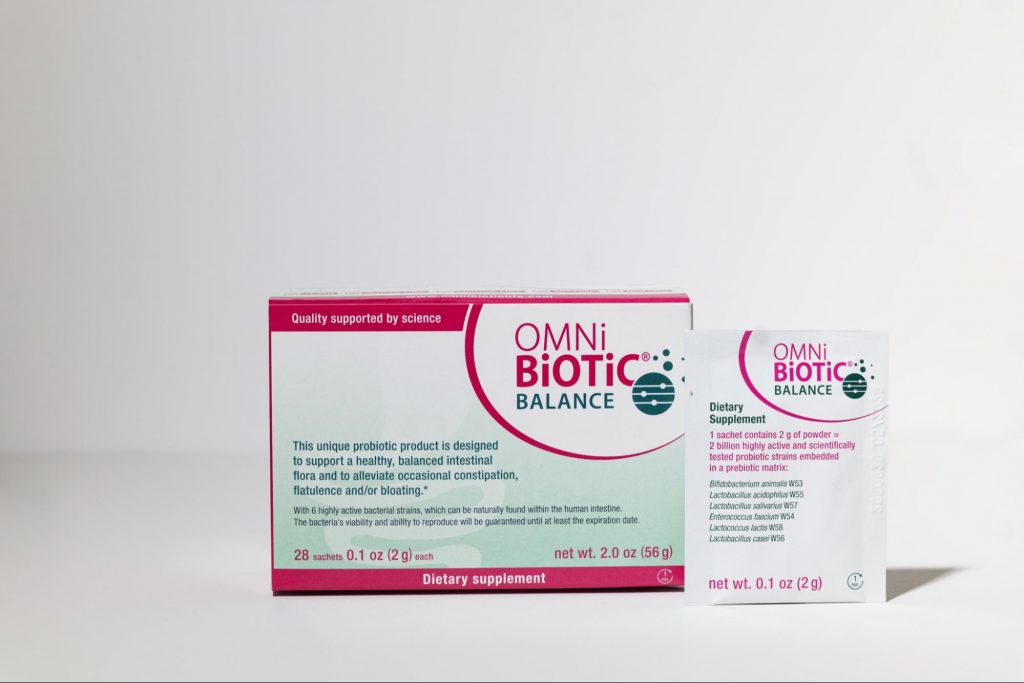Probiotics help alleviate constipation in children, pregnant women, and adults of all ages. Specific strains increase the speed at which food moves through the digestive tract, helping you to go more frequently. They also improve the consistency of stool, making it less painful to pass.
Feeling a little backed up? You’re not alone. An estimated 14-16% of adults worldwide are believed to experience constipation at any given time. But depending on how you define the condition, that number can reach 80%.
Regardless of how it’s defined, we all know how awful constipation can feel. Over-the-counter remedies like stool softeners, laxatives, and bulking agents can be a quick fix, but research shows that almost half of constipation sufferers don’t get the relief they’re looking for.
Getting probiotics through fermented food or dietary supplements, offers an alternative to traditional constipation interventions. These good gut bacteria perform specific actions that get your digestion back on track.
How Can Probiotics Help with Constipation?
According to the National Institutes of Health, constipation is the occurrence of any or all of these symptoms:
- Passing stool less than three times per week
- Having hard or lumpy stool
- Feeling like you didn’t get everything out
- Bowel movements that are painful or difficult to pass
Even occasional constipation can throw off the balance of your digestive system, because fecal matter contains waste products including many species of pathogenic microorganisms. As it lingers in your colon, it can begin to alter the balance of your gut microbiota.
Probiotics, particularly the strains Lactobacillus and Bifidobacterium, populate your gut with beneficial bacteria which:
- Help the colon maintain a healthy lining of mucus to facilitate the process of defecation.
- Produce short-chain fatty acids in the colon. These lower the colon’s pH, and promote movement (called peristalsis) and the sensation “to go”.
- Metabolize bile acid salts which regulate the balance of neurotransmitters in the colon. This also helps increase peristalsis.
- Softens the consistency of stool, making them easier and less painful to pass.
Can Probiotics Help with Chronic Constipation?
Occasional irregularity is one thing, but chronic constipation can significantly impact quality of life. In fact, it’s the most common digestive complaint in the U.S. and accounts for 92,000 hospitalizations annually.
Factors that often lead to chronic constipation include:
- Advanced age
- Pregnancy
- Consuming little to no dietary fiber
- Dehydration
- Low socioeconomic status
- Presence of underlying health problems
- Some medications like opioids or certain cancer treatments
The causes of what’s known as “functional gastrointestinal and bowel disorders” are complicated, multifactorial, and not yet completely understood. Even still, researchers believe probiotics can play a role in improving the quality of life for those who experience issues.
Lots of research focuses on the role probiotics can play to ease constipation. The problem is that since probiotic supplements are designed differently, the results on a larger scale are hard to interpret.
Nevertheless, a recent meta-analysis of randomized controlled trials (RTC) found 14 of best-designed studies on probiotics and chronic constipation, and concluded that they do in fact produce quantifiable results.
Specifically, the analysis determined probiotic supplements increased gut transit time—the time it takes for food to move through the digestive system—by about 12 hours, and clinical study participants had 1.3 times more bowel movements per week on average. Bloating was reduced, and stool consistency improved.
Whether you’re dealing with annoying occasional irregularity or problematic chronic constipation, probiotics work the same way to improve gut health and reduce the occurrence of digestive discomfort.
Can Probiotics Help Gut Motility and Affect Constipation?
Gut motility refers to the digestive system's movement. A person with poor gut motility may eventually develop chronic constipation. A handful of studies have now established that probiotics' beneficial effects on gut motility are regulated by the nervous system, this provides evidence that probiotics may aid in the regulation of the ENS or CNS to restore gut motility.

How Long Will It Take for Probiotics to Work for Constipation?
That’s hard to say. Everybody is different, and so are the underlying causes of constipation. The duration of studies showing the efficacy of probiotics generally spanned four weeks to ninety days.
Even though research can’t give us a definitive answer, many people report feeling better within hours or days of taking a high-quality, multi-strain supplement.
Depending on what’s causing your sluggish digestion in the first place, you may be able to take actions that support probiotics in their effort to balance your microbiota.
For example, if you experience irritable bowel syndrome constipation and don’t eat much soluble fiber, adding more fiber into your diet could help rebalance your digestion as well as support your probiotic’s impact.
Being more active is another way to keep your bowels moving. If you can move a little more, you may have faster results. Of course, this isn’t possible for everyone.
Another important thing to keep in mind is probiotics do more for your body than just help maintain regular digestion. So while it’s not possible to make a blanket statement as to how long they take to start working on your constipation, chances are you could quickly start feeling the health benefits of probiotics in other ways.
Do Probiotics Help You Poop?
Yes. Not only do they help you poop, they help keep your poop healthy. If you’re not sure what that means, check out the Bristol Stool Chart for an illustrated visual:

Probiotics help you poop because they shift the balance of microbes in the gut from harmful to beneficial. This benefits the whole digestive system in several ways. For example:
- Certain strains of probiotics modulate the immune system and help the body resist infections that affect digestion and regularity, such as Clostridium Difficile.
- Probiotics may improve symptoms of IBS, thereby alleviating constipation stemming from a dysfunctional digestive system (probiotics can also reduce diarrhea, abdominal pain, and gas and bloating).
- A gut microbiome full of healthy microbes works at just the right speed to allow nutrients from your food to be properly digested while expelling what it doesn’t need in the form of poop on a regular, predictable schedule.

Considerations When Taking Probiotics for Constipation
If you’re considering taking probiotics to increase stool frequency, it’s also helpful to evaluate any and all other factors that might be contributing to the problem.
Is there anything else you can do to influence your digestive health along with taking probiotics? If medically appropriate, see if you can:
- Up your water intake.
- Consume more soluble fiber (from food like oats, brown rice, leafy greens, etc.) that will act as prebiotics for your good bacteria.
- Increase your activity level.
- Ask your doctor if any medications you’re taking can be contributing to constipation and if there is an alternative.
While probiotics are safe for an overwhelming majority of people, those who are dealing with critical health conditions should consult a probiotic-literate healthcare professional for medical advice.
Finally, sometimes people feel temporary side effects when they begin taking a probiotic supplement. Gas, bloating, and general stomach upset can occur as the gut microbiota rebalances.
This generally subsides after a few days but if it doesn’t, here are a few tips:
- While it's best to take probiotics on an empty stomach, you could try taking your supplement with food while your body adjusts.
- Reduce the amount you’re taking and gradually increase the dose.
- Make sure there are no ingredients in the supplement you might be allergic to, like gluten or dairy.
- Consider trying a product that contains different strains of bacteria.
Can Probiotics Cause Constipation?
Not in most cases, but it can happen. For example, taking Saccharomyces boulardii in large doses can slow down digestion and might not be appropriate if you’re trying to speed up your gut transit time.
Most research suggests probiotics, especially Lactobacillus and Bifidobacterium, increase gut motility. But to paraphrase one clinical trial, probiotics are living organisms that produce many different metabolites and interact with many different cells. We have no way of knowing or understanding why results may vary in a small number of cases.
Your best bet is to stick with a supplement formulated with species and strains specifically.

The Best Probiotics for Constipation
When selecting a probiotic supplement for constipation, look for ones with multiple strains of Lactobacillus and Bifidobacterium. Those struggling with chronic constipation tend to have lower levels of these beneficial probiotic strains while having an increase in potentially harmful microorganisms.
Also consider avoiding probiotic products containing gluten, dairy, soy, and yeast. If your gut is out of balance, its lining could be more permeable than it’s meant to be. This allows undigested molecules into the bloodstream—often called “leaky gut”—and gluten, dairy, soy, and yeast are particularly problematic for many people with leaky gut.
Omni-Biotic Balance is a probiotic supplement that combines six strains of beneficial bacteria specifically shown to increase the frequency of bowel movements and improve stool consistency while leaving out fillers that can exacerbate digestive distress.
What is the Best Probiotic for Regularity?
Even if you’re really proactive about your health, countless everyday things can throw off your gut balance. Illness, stress, hormones, food, and travel can all contribute to changes in bowel habits. Making sure your gut is regularly populated with a variety of good gut bacteria is the best way to stay on track long-term.
For this purpose, Omni-Biotic Balance can also be highly beneficial. This probiotic supports overall intestinal and digestive health, while also supporting your natural immunity. It is a great choice for everyday probiotic support.

Conclusion
Constipation, especially when it’s chronic, really stinks.
Prescription and OTC remedies can provide some relief but they don’t address the underlying dysbiosis. Research shows probiotics can improve conditions in the colon, thereby increasing the frequency and ease of going to the bathroom.
Selecting the right probiotic supplement doesn’t have to be daunting. Omni-Biotic BALANCE provides six well-researched strains specifically shown to help keep bowel movements regular and the gut healthy.
FAQ’S:
1. Do probiotics help with constipation?
Yes, certain probiotic strains like Bifidobacterium lactis and Lactobacillus casei have been shown to support regular bowel movements and enhance gut motility, potentially alleviating constipation symptoms.
2. Are probiotics considered laxatives?
No, probiotics are not laxatives. They work by balancing gut bacteria to promote digestive health, rather than stimulating bowel movements directly.
3. Can probiotics improve stool consistency?
Yes, probiotics can help improve stool consistency by restoring a healthy balance of gut bacteria, which may result in softer stools.
4. How long does it take for probiotics to affect bowel movements?
The time frame varies, but some individuals may notice improvements in bowel regularity and stool consistency within a few days to weeks of consistent probiotic use.
5. Are all probiotic strains effective for digestive health?
No, the effectiveness of probiotics depends on the specific strain and its intended purpose. It's important to choose strains that have been clinically studied for your particular digestive concerns.
6. Can probiotics help with irritable bowel syndrome (IBS)?
Some probiotic strains may help alleviate symptoms of IBS, such as bloating and irregular bowel movements, by restoring balance to the gut microbiome.
7. Is it safe to take probiotics daily?
For most healthy individuals, daily probiotic supplementation is considered safe. However, it's advisable to consult with a healthcare provider before starting any new supplement regimen.
8. Can probiotics cause side effects?
Some individuals may experience mild digestive discomfort, such as bloating or gas, when first starting probiotics. These symptoms typically resolve as the body adjusts.
9. Should probiotics be taken with food?
Taking probiotics with food may help protect the beneficial bacteria from stomach acid, enhancing their survival and effectiveness.
10. Can probiotics be used alongside other medications?
Probiotics can often be used alongside other medications, but it's important to consult with a healthcare provider to ensure there are no potential interactions.




